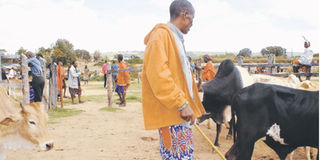Mobile banking changing lives

In the remote, semi-arid and cattle-rustling prone Samburu region, where highway banditry is not uncommon, something new is sweeping through the locale, and changing lives — mobile banking.
In the remote, semi-arid and cattle-rustling prone Samburu region, where highway banditry is not uncommon, something new is sweeping through the locale, and changing lives — mobile banking. While the use of mobile phones to transfer money has been a breakthrough for most Kenyans, they are more of a lifeline than a luxury for the Samburu people.
And you do not have to look far to see the impact this form of banking, which has the potential to offer low cost, easily accessible financial services to a high number of Kenyans who do not have bank accounts, has had on the people’s lives in this area.
A drive through Maralal town and other small trading centres in Samburu shows rows of shops and stalls freshly painted in the bright colours of the competing mobile phone companies, Safaricom and Zain.
The larger Samburu region, which consists of four districts, is served by only one commercial bank, and having an outlet that offers mobile banking service such as M-pesa or Zap, offers a chance for some brisk business.
Mrs Margaret Leshore, a trader and M-Pesa agent in Maralal, says locals have a lot of cash from their pastoralism businesses, but are faced with high insecurity and non-existent banking services.
“In Samburu, there is only one commercial bank and before the introduction of mobile banking, most residents who live in the villages away from town travelled many kilometres to withdraw money and faced numerous security risks. But mobile money transfer services have really changed our lives,” says Mrs Leshore.
Money’s interviews with mobile users in Samburu region established that mobile banking services are now being used not only for transfer of money but also for security reasons. Mr Peter Leatore, a businessman in Maralal, says services like M-Pesa have become an part of his livestock business.
Whenever he goes on a business trip to Rumuruti town to sell his animals, he deposits all his travel cash in his M-Pesa account. He then detaches his SIM card once he hits the bandit-prone highway from Rumuruti to Maralal. Once in Rumuruti, he “withdraws” the money from his M-Pesa account, and repeats the ritual on his return trip after selling his cows. “My mobile phone has really changed the way I operate my business. It has now become easier for me to send money, check livestock prices, run other businesses and keep in touch,” he says.
This shows just how pervasive mobile banking has become in rural areas, and how e-money is contributing to the economic development of users in Northern Kenya.
Mrs Maliyan Letiwa, who sells beads and traditional shuka (pieces of cloth) in Maralal, used to spend Sh5,000 on transport, food and accommodation to buy beads, jewellery, ornaments and shuka in Nairobi, but having a mobile phone has reduced her costs.
“Now, all I need is to pick up my phone and make a five-minute call and my wholesaler in Nairobi loads my goods on the bus and I receive them without much hassle,” she says.
However, both agents and customers in Maralal and other trading centres in Samburu complain of cash float problems. Because a majority of transactions in the village are withdrawals, agents must maintain their cash float. They do this by making frequent trips to the bank.
“Cash float is a big challenge here, especially if the agent is operating far from Maralal town, where the only bank in the region is located. Those who live in places like Baragoi, more than 200 kilometres from Maralal, have to travel all the way to shore up their float,” says Mrs Leshore.
But despite these cash float problems, majority of the customers in rural Samburu assert that they prefer M-Pesa or Zap over other money transfer services. Mobile banking offers them some substantial benefits.
In Baragoi Trading Centre, in the arid Samburu North District, this benefit comes in the form of savings on transport. Customers do not need to travel to Maralal, the nearest town, to access the service.
“I can just walk from my house and get some money. I don’t have to spend Sh500 to travel to Maralal. If the agent does not have cash today, then I will come back tomorrow. It is cheaper to wait,” said one resident.
Finding strategies to manage the cash float problem will undoubtedly be one of the greatest challenges for Safaricom, Zain and other service providers in places like Samburu. For now, however, it seems customers are willing to accept the inefficiencies of the services.
Lack of network coverage in most areas has also proved to be a real challenge. According to Mrs Leshore, most mobile network subscribers in remote villages are forced to climb trees and hills to make calls and to confirm whether their money transfer transactions have been successful.
Some local residents also argue that mobile money transfer services have affected social relations between senders and receivers because urban workers, expecially men, no longer need to make the trip back home to deliver money.
“It is true, most of them have cut back on the number of visits to their rural homes – visits they made frequently before M-Pesa and Zap. There are many complaints from married women that their husbands no longer visit them in the village,” says Mr Leatore.




